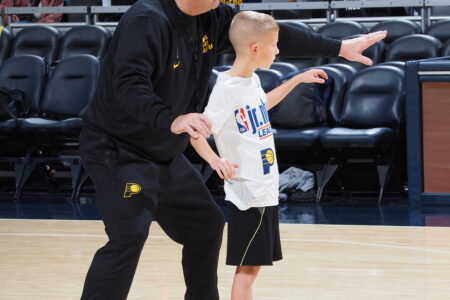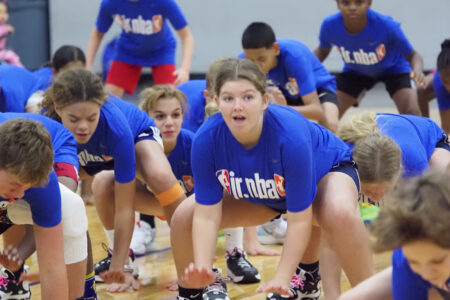Series: Improve Your Mental Game—Positive Self-Talk
11 July 2022
We’re covering the Jr. NBA and NBA Academy’s Next Level Mentality program, a 10-part series curated from mental health performance coaches in the NBA and WNBA that’s designed to help youth athletes improve their mental approach, and individual and team performance.
Self-talk is pretty simple—it’s our internal dialogue. Good and bad, encouraging and distressing, it’s the thoughts influenced by our subconscious mind. We do it so often throughout the day that sometimes we don’t even realize it’s happening.
But focusing on positive self-talk is important in youth sports—and life, really—because how your child talks to themselves can make a big impact on how they feel and perform. If their internal dialogue is hurtful instead of motivating, they’ll have an additional hurdle to overcome when achieving their goals.
Even more, self-confidence is directly influenced by self-talk. After all, being confident is a belief that starts within. That said, it’s not always easy to keep a positive mindset, especially when you’re feeling down, stressed, or under pressure.
Luckily, mental performance coaches in the NBA and WNBA have mastered strategies to practice positive self-talk every day. The goal? To turn positive self-talk into a habit that requires less discipline and simply becomes routine. Follow their five trusted strategies to help your child practice positive self-talk.
5 strategies to practice positive self-talk
Have awareness
Pay close attention to the impact of your words. If you’re feeling extremely upset after you make an honest mistake, it’s probably because you’re criticizing yourself in that moment without even realizing it.
Identify negative self-talk traps
There are certain situations that may increase your self-doubt and therefore lead to more negative self-talk. Slow down and take pause during a stressful event or on a bad day and cut yourself some slack. If there are scenarios that constantly lead to negative self-talk, go into them prepared and ready to balance your mind.
Shift your language
After you catch yourself in a negative self-trap moment, it’s time to actively reframe your thoughts, shifting your language to something more encouraging. Remember—when you try your best, it’s always enough.
Give yourself positive affirmations
Seeing words or inspiring images can help redirect negative thoughts. For example, put a post-it on your mirror that says, “Today will be a good day!” Or even better, write a new note every week to stay motivated.
Surround yourself with positive people
Sometimes we absorb the emotions of the people around us. Stick to a group that will lift you up and encourage you always.
Positive self-talk during a game
When the clock is running and the pressure is on, your child may have a hard time clearing the noise in their head. One way you can help them cope with negative thoughts during a game is by using a cue or trigger; this strategy is called “thought stopping.”
For example, some athletes say “stop” in their head, some snap their fingers, or hit their hand against their thigh to shake the negative self-talk. Let’s say your child misses a shot during the game. Their internal dialogue may begin to say, “I’m a terrible shooter. I can’t make anything right now.” Eventually, after enough misses, they won’t want to shoot anymore. But if they have a cue word or an action that can stop themselves from letting the negativity take over, they can improve their self-talk and play better.
To learn more about Next Level Mentality and view the nine other guides, visit Jr. NBA’s website.*
*By clicking the link, you’ll be redirected to Jr.NBA.com. This site has its own Privacy Policy and Terms of Use that you agree to when you visit the site.







